The 2017 PB Scotland Conference was held the 14 November and the theme was: How far have we come with participatory budgeting in Scotland?
A lot of great work has been carried out in Scotland, with communities across the country getting to decide how to spend budgets on local activities and projects that matter to them - there is much to be excited about!
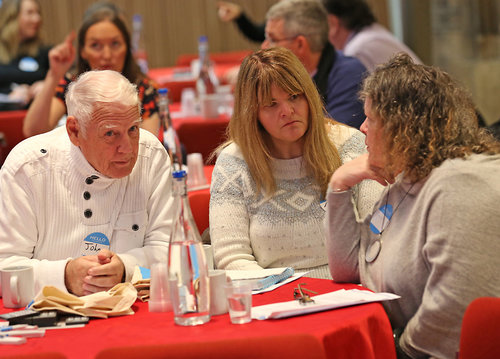
At the same time, the conference recognised that we are at a critical point in Scotland, where we need to reflect on how transformational PB has really been. There are legitimate questions around the extent of impact PB has had on communities, how equality has been accounted for and whether institutions are really ready to share power in the way that PB is designed to do.
To address these issues, the conference broadly agreed on the following five actions as a starter* :
*These actions attempt to summarise a larger list of actions from the day. Over the next few weeks, PB Scotland will refine and possibly add to these five summary actions in collaboration with the PB Scotland Network.
Read on to find out how we got there...
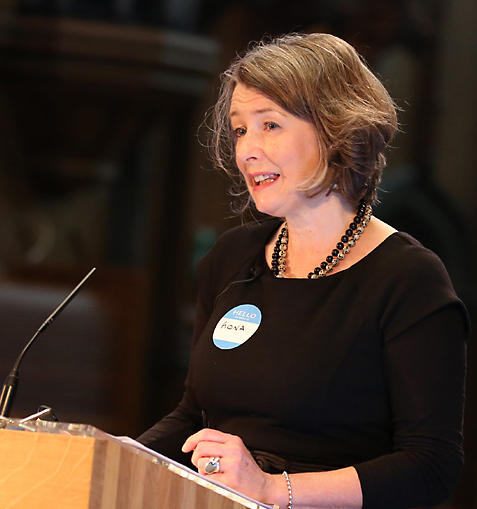
Taking place at St Paul's & St George's Church, Edinburgh on 14th November 2017, the conference brought together around 100 people working in and/or interested in PB in Scotland.
Those in the room included people working for local authorities and other statutory agencies, from the community and voluntary sectors, academics and the Scottish Government.
Delegates were given a warm welcome by SCDC Director and Chair for the day, Fiona Garven who gave a brief introduction to PB's development in Scotland over the last few years.
Fiona used live voting to gauge how people felt about the PB that's been happening across Scotland, with 54% of the room saying they were "sold" on PB and 36% stating they were "enthusiastic but a bit worried."
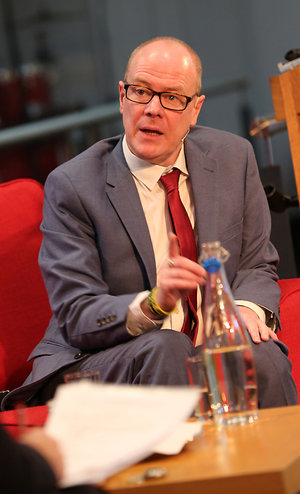
Minister for Local Government and Housing, Kevin Stewart then did a bit more convincing, sharing some key indicators as to how far we have come with PB in Scotland. For instance, in 2016/17, 39,484 people in Scotland voted at 122 local PB events & online.
He also highlighted the £4.7 million invested in PB by the Scottish Government since 2014, as well as the recent commitment from COSLA and the Scottish Government to disburse 1% of local authority budgets through PB by 2021.
"More power to all of our elbows for making PB an even greater success" - Minister for Local Government and Housing Kevin Stewart
#pbscot17 @KevinStewartSNP highlights the extra gains pb can bring, beyond money. Sharing resources, building community confidence etc
A panel discussion was then held, bringing together the varied perspectives of Kevin Stewart MSP, Jan Pringle from Burnfoot Community Futures and Vice President of COSLA, Cllr Graham Houston. Chaired by Dr Oliver Escobar of What Works Scotland and University of Edinburgh, the panel discussion ranged from the positive experiences of PB so far to the challenges faced by local authorities in hitting the 1% target. Some interesting observations were made, including Jan's comment that the small-grants model of PB is a great starting point for introducing communities to PB as it is easy to digest.
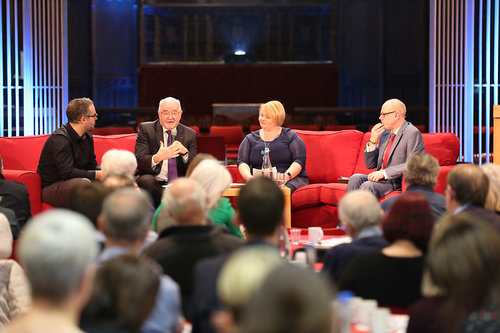
Jan Pringle opening discussions by acknowledging communities can be sceptical about PB - after years of being 'done to' they ask whether they're really going to be trusted to decide - but once convinced can 'do something quite radical' #PBscot17https://twitter.com/UKPBNetwork/status/930381790203797504 …
The conference really got into its participatory swing before lunch, when delegates took part in one of five workshops, which ran as follows:
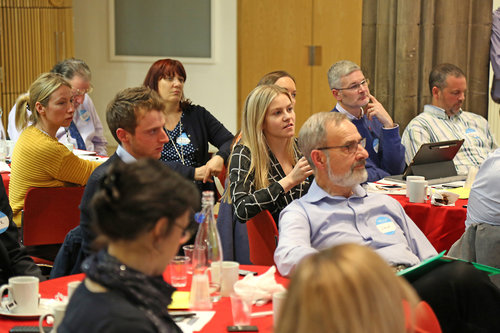
In this workshop, PB Scotland and PB Partners highlighted the resources and support available to promote good PB practice. Participants were introduced to the national PB Champion's programme, with some of the champions detailing their experiences so far. Discussion covered what is working well, and what else might be needed to ensure we all (from communities to politicians) have the capacity and the skills we need to make sure PB in Scotland is properly democratic.
The main input in this workshop came from Nicky MacCrimmon of Dundee City Council about their £1.2m mainstream PB programme for 2017/18. In light of the recent commitment from COSLA and the Scottish Government to disburse 1% of local authority budgets through PB by 2021, participants discussed the challenges and implications of 'mainstreaming' PB in Scotland. The need to allow for local flexibility in how the 1% is implemented was recognised, with shared learning seen as a vital part of the wider process.
Adding an international flavour to the workshops, this session heard from colleagues delivering PB in Paris and Portugal. Participants then discussed the similarities and differences between PB in Scotland and the international examples. The workshop finished with a conversation about the next steps for PB in the three different contexts.
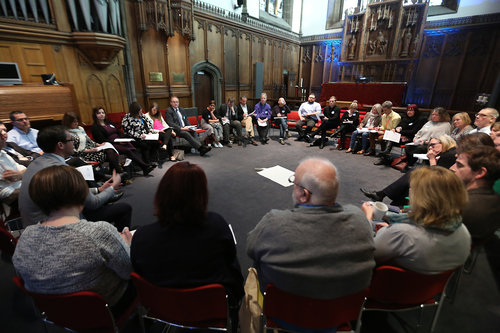
This workshop heard from both the Church of Scotland and Leith Links Community Council about their respective community-led small-grants PB processes. There was an emphasis on learning from the small grants processes when planning future PB, including any mainstreaming of PB. For example, a key learning point is that community involvement in PB can be widened by designing simple, accessible and social processes which bring people into decision making, and spark ideas and small projects. Furthermore, it was agreed that we shouldn't lose the energy, community spirit, connections, and additional benefits which come from smaller-scale events.
Since 2015, the Democratic Society has worked from Shetland to the Borders to bring digital elements to participatory budgeting processes. This workshop gave a brief tour of digital PB processes before going into a group discussion about the challenges and opportunities in taking PB online.
After a well-received lunch, Nelson Dias of the Network of Participatory Municipalities, Portugal, presented on how PB has been used in Portugal over the last 15 years.
He highlighted that Portugal has the highest percentage of municipalities (38%) voluntarily experimenting with PB out of any country in the world. This is despite the country being severely affected by the global financial crisis, growing restrictions on local government and low levels of public trust in democratic institutions.
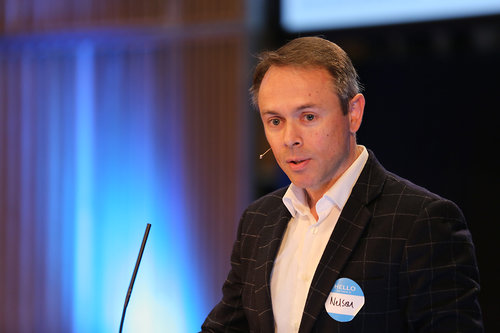
#PBscot17 Nelson Diaz sharing the "Network of participatory municipalities" importantly it is wider than #participatorybudgeting and has relationships with other countrie
The final input on the day came from Angela O'Hagan from Glasgow Caledonian University, who has been part of research team at the University conducting an ongoing evaluation study of participatory budgeting (PB) activity in Scotland.
Angela broadly welcomed PB in Scotland while reminding the conference that a lot of work still needs to be done, particularly around recasting the relationship between citizens and institutions so that people have more influence, and also around the extent to which PB in Scotland is involving equality groups.
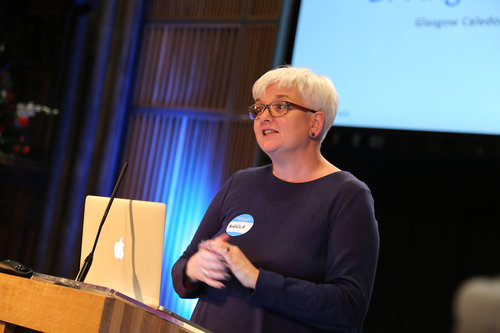
How important are these themes from the report to you? #pbscot17
Building on Angela's presentation, conference participants were then asked to use their electronic voting pads to indicate the importance they attached to key themes from the report.
The majority of delegates felt that all four themes were important, adding more strength to the report's findings.
Around their tables, participants were given the job of generating key actions based on these themes. The PB Scotland team summarised these actions into five headline actions and, as a final task, conference participants used their voting pads to indicate how much they agreed with the five actions.
Scroll back to the top of this article to see the 5 actions agreed.
Wrapping up, Fiona Garven thanked attendees, speakers, workshop hosts and everyone else! And don't forget to join the Network!
But rather than us summarise the day – here's what you said...
We had a great day at the PB Scotland Conference yesterday! #pbscot17
"It was very local authority orientated – more community emphasis for me"
— Participant feedback
"Angela O'Hagan research was a particular highlight and look forward to reading learning from this work – much needed!"
— Participant feedback
"Good speakers. Helpful to hear research findings. Good to meet people"
— Participant feedback
This report was published on the PB Scotland Webiste by Andrew Paterson